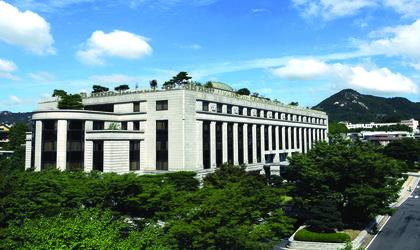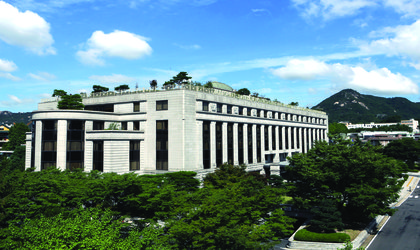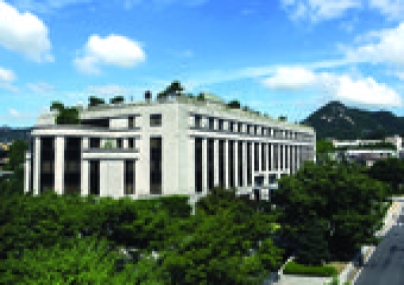
Third Congress of the World Conference on Constitutional Justice scheduled for Sep. 28 to Oct. 1, 2014
On the topic of "Constitutional Justice and Social Integration," the Constitutional Court of Korea will host the 3rd Congress of the World Conference on Constitutional Justice (WCCJ), a four-day international conference that brings together top leaders in constitutional justice from around the world in Seoul starting from Sep. 28 this year. The Congress will be represented by the heads of all courts exercising constitutional jurisdiction, such as constitutional and supreme courts, as well as the representatives of international organisations from approximately 100 countries, who will present ways to resolve the intensifying social conflicts faced not just by Asia, but by the world at large.
The World Conference on Constitutional Justice, a permanent body uniting constitutional courts, constitutional councils and supreme courts across the world, was organised to promote constitutional justice as the key element of human rights protection, democracy and the rule of law. The courts of constitutional jurisdiction across the globe have formed regional or language-based groups in their respective regions, such as the Association of Asian Constitutional Courts and Equivalent Institutions, the Association of Constitutional Courts using the French Language and the Conference of European Constitutional Courts, in their concerted efforts to share experience and knowledge. And the Venice Commission, which acts as the Council of Europe's advisory body on constitutional matters, has been providing support in these activities. In this context, it has come to the attention of the Venice Commission that these regional, linguistic groups should be expanded to a global scale by involving all courts exercising constitutional jurisdiction around the world. Finally in January 2009, the Commission held the first Congress jointly with the Constitutional Court of South Africa, marking the first step for the World Conference on Constitutional Justice. The Commission held the second Congress in cooperation with the Federal Supreme Court of Brazil in January 2011, and the draft statute of the World Conference was made more specific on that occasion. This draft statute was adopted at a meeting of the Bureau of the World Conference in May 2011 and entered into force in September the same year, finally taking shape as a permanent body. In the initial stage in 2011, there were merely 30 constitutional courts/councils and supreme courts that joined as members. But within three years, the membership increased dramatically to 90 countries (as of July 2014) and the members engaged in active exchange and cooperation, which has turned the World Conference into the highest-level forum on constitutional justice in the true sense of the word.
The upcoming 3rd Congress of the World Conference follows the ones in South Africa and Brazil in 2009 and 2011, respectively. Being held for the first time since the World Conference officially became a permanent body, it is also dubbed the inaugural Congress. And holding this inaugural gathering in the Asian continent instead of Europe that has a long history in constitutional justice is very meaningful indeed. The international community anticipates the forthcoming Congress to be an opportunity for democracy and the rule of law to advance further and promote human rights throughout the Asian region.
The topic of the 3rd Congress is "Constitutional Justice and Social Integration," and participants from countries around the world will pool their experience and expertise and propose ways to achieve social integration. The topic proposed by the Korean Constitutional Court was adopted at a meeting of the Bureau of the World Conference. The remarkably rapid growth of the Republic of Korea came with a number of causes for conflicts yet unresolved, and the Korean Constitutional Court has been acting as a mediator of such conflicts in its efforts to bring society together. However, conflict and division is not an issue of Korea alone. Since the financial crises in 1998 and 2008, conflicts have been intensifying not just in Korea but in other corners of the world; this is a very timely topic.
Korea's full-blown democracy and the Constitutional Court
Driven by the overwhelming desire of the Korean people to achieve true democracy, the Constitutional Court of Korea came into being on Sep. 1, 1988. The Court's achievements over the past 26 years have been truly remarkable. Simply by the facts, a total of 25,012 cases were handled as of late June 2014, and in as many as 1,227 cases, the Court struck down contested laws (unconstitutional or constitutionally incompatible) or upheld complaints against the violation of fundamental rights by governmental powers. These figures attest to the fact that, for the past 26 years, constitutional justice was most active and effective throughout Korea's constitutional history. Thanks to more vibrant use of constitutional justice, constitutional norms have become a practical standard for various legislative acts or the exercise of governmental powers; the Constitution has established itself as the supreme law of the land that permeates peoples’ everyday lives. What is more, constitutional justice functions as the final mediator of social conflicts and divisions surrounding the issues of national, social importance and has earned the highest trust of the Korean people.
As one of Asia’s leading nations in constitutional justice, the Korean Constitutional Court has constantly worked to share its achievements with other countries. The Court has transferred its experience and knowledge to many countries, including Cambodia, Indonesia, Mongolia, Thailand and Turkey, and recently, played a leading role in creating a regional forum for constitutional justice in Asia, namely the "Association of Asian Constitutional Courts and Equivalent Institutions" and hosted the Association’s Inaugural Congress in 2012. Moving forward, the upcoming 3rd Congress of the World Conference is expected to serve as a forum to share the Korean model of constitutional justice, which differentiates itself from the two key pillars modeled after the systems of the United States and Germany, with not just the Asian countries, but the entire world.

